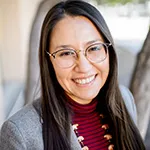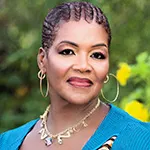Plenary Speakers
Contact
Kofi Annan Institute for Global Citizenship (IGC)Markim Hall, Third Floor 651-696-6655
651-696-6750 (fax)
igc@macalester.edu
facebook twitter
“We Must Make Kin to Get Free”

Melanie Yazzie (Diné) is Assistant Professor of American Indian Studies at the University of Minnesota and coauthor of Red Nation Rising: From Bordertown Violence to Native Liberation and The Red Deal: Indigenous Action to Save the Earth, both of which came out in 2021. She co-hosts and produces the podcast Red Power Hour and serves as lead editor for the open access journal Decolonization. She organizes with The Red Nation, a grassroots Native-run organization committed to the liberation of Indigenous people from colonialism and capitalism.
Abstract: “How can we draw from acts and forms of kinship to strengthen our dreams of being free? Looking at a specific example of Indigenous political intervention that occurred in January 2017 during the airport protests against President Donald Trump’s Muslim ban, I explore relations of caretaking that form the center of abolitionist and decolonial projects, particularly those espoused by radical Black and Indigenous feminists. I bring Indigenous and Black feminist traditions of relationality together to chart a different path of relationality, one not overdetermined by relations of abandonment, harm, and scarcity that drive the carceral regimes of capitalism and colonialism.”
“Decolonize and Depatricarcalize Knowledge Through Women and Feminist Thinkers from Chiapas and Central America”

Marisa Ruiz Trejo is a feminist anthropologist, writer, journalist, and activist from Chiapas, Mexico. Full-time professor at the Universidad Autonoma de Chiapas (UNACH). She directed the Cultural Diversity Studies and Social Spaces Master’s Program (2017-2019) at UNACH. She got a Ph.D. in Anthropology and Latin American Studies, at Universidad Autonoma de Madrid and was a visiting scholar at the Anthropology Department of New York University (2014 and 2019) and the Ethnic Studies Department of California, Berkeley (2012). In 2016, she contributed to the reports on racism, genocide, and sexual violence against q’eqchi’ Indigenous women in the Sepur Zarco case in Guatemala. This is the most significant legal case of sexual violence committed by the army during the genocide to be won in a domestic court in Guatemala.
Marisa Ruiz Trejo was also an ILAS Edmundo O’Gorman Fellow at Columbia University and a professor at the Latin American Council of Social Sciences (CLACSO). Among her recent publications are Feminist Anthropologies in Mexico: epistemologies, ethics, practices, and diverse views (co-edited with Berrio, Castañeda, Goldsmith, Salas, and Valladares) (UNAM, UAM-I, UAM-X, and Editorial Bonilla, 2020), Decolonize and depatriarchalize the Social Sciences, memory, and life in Chiapas, Central America, and the Caribbean(2020, UNACH), and Make a body pa we Uwach Ulew u b’iam América Latina (AVANCSO, Guatemala, 2021).
Abstract: “Arguments not only for decolonizing, but also for depatriarchalizing frameworks of knowledge, have contributed to change the North American/Eurocentric epistemic hierarchies. At the same time, anti-colonial and feminist epistemologies have proposed decolonial possibilities for Social Sciences, Humanities, social movements, memory, and Life.
Writings by Indigenous and Afro-descendant women and feminists, sexual dissidents, revolutionaries, and social activists have created epistemic ruptures to the dominant imaginaries of knowledge. In Latin America, the emergence of anti-colonial, decolonial, feminists and LGBT+ movements denounced the “coloniality of power and knowledge”. In this lecture, I focus on the life and work of some women and feminist thinkers in Chiapas, Southern Mexico, and Central America. With a special focus on the decolonization of anthropology, I work on several stages: from the early contributions of the pioneers in anthropology and ethnography (1940-1964); the participation of Marxist, Gramscian and anticolonial women thinkers in contexts of repression in Central America (1964-1989); to the investigations of feminist, indigenous, Afro-descendant and LGTB+ anthropologists of the new generations with different challenges (1990-2020).”
“How to Commit Crimes Against Reality”

Adam Khalil, a member of the Ojibway tribe, is a filmmaker and artist from Sault Ste. Marie, Michigan, whose practice attempts to subvert traditional forms of image-making through humor, relation, and transgression. Khalil is a core contributor to New Red Order and a co-founder of COUSINS Collective. Khalil’s work has been exhibited at the Museum of Modern Art, Sundance Film Festival, Walker Art Center, Lincoln Center, Tate Modern, HKW, Museum of Contemporary Art Detroit, Toronto Biennial 2019 and Whitney Biennial 2019, among other institutions. Recent exhibitions have been held at Kunsthal Charlottenborg in Copenhagen and Spike Island in Bristol. Khalil is the recipient of various fellowships and grants, including but not limited to a 2021 Creative Capital Award, 2021 Herb Alpert Award, Sundance Art of Nonfiction, Jerome Artist Fellowship, Cinereach and the Gates Millennium Scholarship.
Abstract: ““Do you want to realize your fullest potential? Be your truest self? Act with confidence? Attract abundance? Alleviate anxiety? Experience clarity? Know your purpose? Be the change you want to see? Be truly present? Experience real freedom? Change the world? Be a part of the solution?
On some level, we all want to feel this way, but sometimes in our globalized, capitalist, settler-colonial society it feels impossible. Which is why the New Red Order is developing a dynamic system to help our accomplices achieve all of this and more. This sneak peek of our free introductory video, Never Settle, will tell you what you need to know to take control of your life today!”
– New Red Order
With a prankster’s side-eye and biting critique, Adam Khalil’s work breaks and bends linear time and weaves narrative, documentary, and experimental forms together with humor and unapologetic political inquiry to address the ongoing trauma of colonization. His practice involves multiple collaborations. A member of the Ojibway Tribe, he is a core contributor to New Red Order, an interdisciplinary “public secret society” that co-produces video, performance, and installation works confronting obstacles to Indigenous growth. Khalil presents a personally curated collection of past and future work samples to introduce their collaborative process, discuss the necessity and fallacy of political art making, and to promote Indigenous futures!”
“The Semi-Colony? Decolonizing Gaps and Reparatory Justice”

Carole Boyce-Davies the H.T. Rhodes Professor of Humane Letters and Professor of Africana Studies and Literatures in English at Cornell University is the author of the prize-wining Left of Karl Marx. The Political Life of Black Communist Claudia Jones (2008); Black Women, Writing and Identity: Migrations of the Subject (1994); Caribbean Spaces. Escape Routes from Twilight Zones (2013) and a bi-lingual children’s story Walking/An Avan (2016/2017) in Haitian Kreyol and English. In addition to over a hundred essays, articles and book chapters, Dr. Boyce-Davies has also published thirteen critical editions on African, African Diaspora and Caribbean literature and culture such as the two-volume collection of critical and creative writing Moving Beyond Boundaries (1995): International Dimensions of Black Women’s Writing (volume 1), Black Women’s Diasporas (volume 2); the 3-volume Encyclopedia of the African Diaspora (Oxford: ABC-CLIO, 2008) and Claudia Jones Beyond Containment: Autobiographical Reflections, Poetry, Essays (2011) and Pan-African Connections (2021). Her forthcoming book is titled Black Women’s Rights. Leadership and the Circularities of Power”(Rowman & Littlefield, Lexington Books 2022). Her popular essays and reviews have appeared in The Guardian (London), The Washington Post, The Crisis, Ms Magazine, Ithaca Journal, The Black Scholar, Miami Herald, Trinidad Express, Trinidad Guardian, Caribbean Today, Caribbean Contact, Newsweek.
Abstract: “Decolonial gaps appear everywhere; in every field, in every geographical location; in a range of relationships and institutional contexts. These are the gaps between the full practice of colonialism and the acquisition of a limited emancipatory experience in most of those locations which maintain a semi-colonial status with their former colonizers. While the British colonial project and its unresolved issues have been an easy and visible target, there are several other angles through which we can examine how these decolonial gaps operate and how knowledge can do reparative justice work “